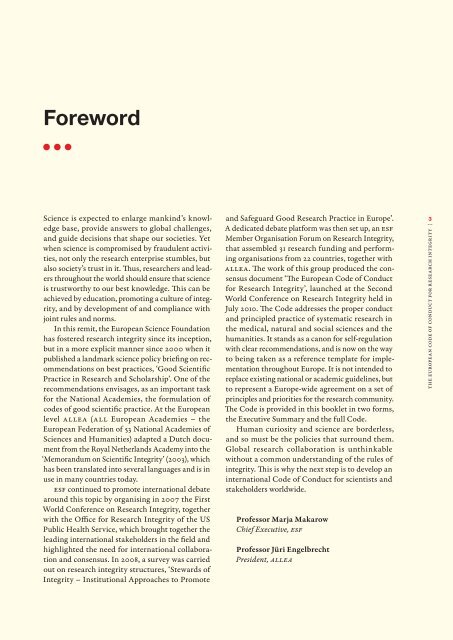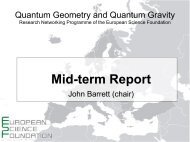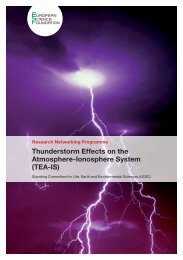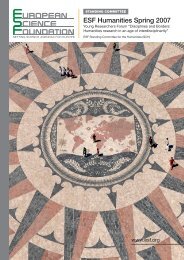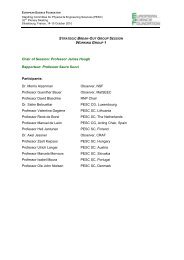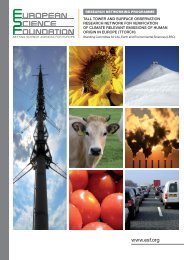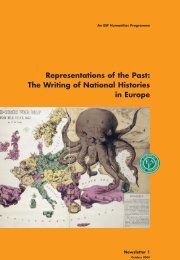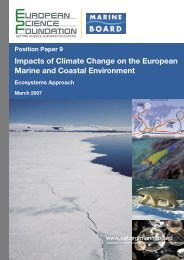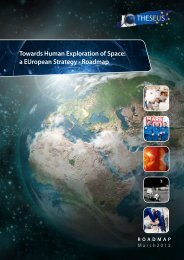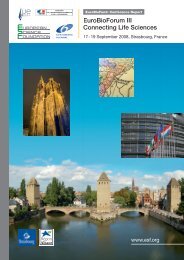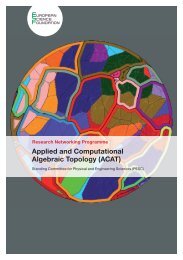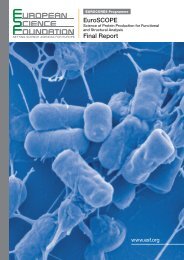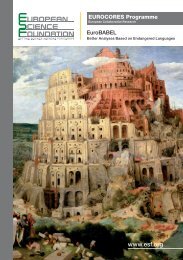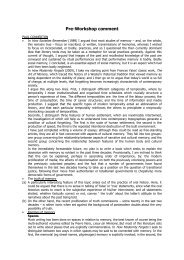The European Code of Conduct for Research Integrity
The European Code of Conduct for Research Integrity
The European Code of Conduct for Research Integrity
- No tags were found...
Create successful ePaper yourself
Turn your PDF publications into a flip-book with our unique Google optimized e-Paper software.
Forewordl l lScience is expected to enlarge mankind’s knowledgebase, provide answers to global challenges,and guide decisions that shape our societies. Yetwhen science is compromised by fraudulent activities,not only the research enterprise stumbles, butalso society’s trust in it. Thus, researchers and leadersthroughout the world should ensure that scienceis trustworthy to our best knowledge. This can beachieved by education, promoting a culture <strong>of</strong> integrity,and by development <strong>of</strong> and compliance withjoint rules and norms.In this remit, the <strong>European</strong> Science Foundationhas fostered research integrity since its inception,but in a more explicit manner since 2000 when itpublished a landmark science policy briefing on recommendationson best practices, ‘Good ScientificPractice in <strong>Research</strong> and Scholarship’. One <strong>of</strong> therecommendations envisages, as an important task<strong>for</strong> the National Academies, the <strong>for</strong>mulation <strong>of</strong>codes <strong>of</strong> good scientific practice. At the <strong>European</strong>level ALLEA (ALL <strong>European</strong> Academies – the<strong>European</strong> Federation <strong>of</strong> 53 National Academies <strong>of</strong>Sciences and Humanities) adapted a Dutch documentfrom the Royal Netherlands Academy into the‘Memorandum on Scientific <strong>Integrity</strong>’ (2003), whichhas been translated into several languages and is inuse in many countries today.ESF continued to promote international debatearound this topic by organising in 2007 the FirstWorld Conference on <strong>Research</strong> <strong>Integrity</strong>, togetherwith the Office <strong>for</strong> <strong>Research</strong> <strong>Integrity</strong> <strong>of</strong> the USPublic Health Service, which brought together theleading international stakeholders in the field andhighlighted the need <strong>for</strong> international collaborationand consensus. In 2008, a survey was carriedout on research integrity structures, ‘Stewards <strong>of</strong><strong>Integrity</strong> – Institutional Approaches to Promoteand Safeguard Good <strong>Research</strong> Practice in Europe’.A dedicated debate plat<strong>for</strong>m was then set up, an ESFMember Organisation Forum on <strong>Research</strong> <strong>Integrity</strong>,that assembled 31 research funding and per<strong>for</strong>mingorganisations from 22 countries, together withALLEA. <strong>The</strong> work <strong>of</strong> this group produced the consensusdocument ‘<strong>The</strong> <strong>European</strong> <strong>Code</strong> <strong>of</strong> <strong>Conduct</strong><strong>for</strong> <strong>Research</strong> <strong>Integrity</strong>’, launched at the SecondWorld Conference on <strong>Research</strong> <strong>Integrity</strong> held inJuly 2010. <strong>The</strong> <strong>Code</strong> addresses the proper conductand principled practice <strong>of</strong> systematic research inthe medical, natural and social sciences and thehumanities. It stands as a canon <strong>for</strong> self-regulationwith clear recommendations, and is now on the wayto being taken as a reference template <strong>for</strong> implementationthroughout Europe. It is not intended toreplace existing national or academic guidelines, butto represent a Europe-wide agreement on a set <strong>of</strong>principles and priorities <strong>for</strong> the research community.<strong>The</strong> <strong>Code</strong> is provided in this booklet in two <strong>for</strong>ms,the Executive Summary and the full <strong>Code</strong>.Human curiosity and science are borderless,and so must be the policies that surround them.Global research collaboration is unthinkablewithout a common understanding <strong>of</strong> the rules <strong>of</strong>integrity. This is why the next step is to develop aninternational <strong>Code</strong> <strong>of</strong> <strong>Conduct</strong> <strong>for</strong> scientists andstakeholders worldwide.Pr<strong>of</strong>essor Marja MakarowChief Executive, ESFPr<strong>of</strong>essor Jüri EngelbrechtPresident, ALLEA3<strong>The</strong> <strong>European</strong> <strong>Code</strong> <strong>of</strong> <strong>Conduct</strong> <strong>for</strong> <strong>Research</strong> <strong>Integrity</strong>


